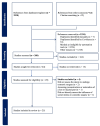Social Media Influence on Body Image and Cosmetic Surgery Considerations: A Systematic Review
- PMID: 39205749
- PMCID: PMC11350482
- DOI: 10.7759/cureus.65626
Social Media Influence on Body Image and Cosmetic Surgery Considerations: A Systematic Review
Abstract
Social media platforms like Instagram (Meta Platforms, Inc., Menlo Park, California, United States) and Snapchat (Snap Inc., California, United States) significantly influence motivations for aesthetic surgery by promoting idealized and digitally enhanced images. Understanding their impact on body image dissatisfaction and acceptance of cosmetic procedures is crucial. A systematic review following Preferred Reporting Items for Systematic Reviews and Meta-Analyses (PRISMA) guidelines explored the link between social media, body image dissatisfaction, and cosmetic surgery. The review included 25 studies with 13,731 participants. Specific findings revealed that 70% of young adult women and 60% of young adult men report dissatisfaction with their bodies, leading to increased surgical considerations. The search process utilized databases such as PubMed, ScienceDirect, and Google Scholar, employing keywords like "cosmetic surgery," "social media," and "body image dissatisfaction" for articles published between January 2013 and December 2023. Both men and women show increased dissatisfaction with body parts, leading to surgical considerations. Social media's emphasis on visual aesthetics fosters body dissatisfaction and social appearance anxiety, especially through selfies. Cultural norms and celebrity influence further shape beauty perceptions. While social media promotes cosmetic surgery acceptance, ethical concerns about misleading advertisements, unrealistic beauty standards, and patient privacy persist. This underscores the need for strategies to promote healthy body image and informed choices in the digital age.
Keywords: aesthetic treatment; and body image dissatisfaction; cosmetic surgery; plastic surgeons; social media.
Copyright © 2024, Mironica et al.
Conflict of interest statement
Conflicts of interest: In compliance with the ICMJE uniform disclosure form, all authors declare the following: Payment/services info: This research was funded by UMF Cluj-Napoca, grant number 647/39/11 January 2024. Financial relationships: All authors have declared that they have no financial relationships at present or within the previous three years with any organizations that might have an interest in the submitted work. Other relationships: All authors have declared that there are no other relationships or activities that could appear to have influenced the submitted work.
Figures
References
-
- The effect and implication of social media platforms on plastic cosmetic surgery: a cross-sectional study in Saudi Arabia from 2021 to 2022. AlBahlal A, Alosaimi N, Bawadood M, AlHarbi A, AlSubhi F. https://doi.org/10.1093/asjof/ojad002 Aesthet Surg J Open Forum. 2023;5:0. - PMC - PubMed
-
- The new dilemma of plastic surgery and social media: a systematic review. Eldaly AS, Mashaly SM. Eur J Plast Surg. 2022;45:371–382.
-
- Social networking site use, self-compassion, and attitudes towards cosmetic surgery in young Australian women. Conboy L, Mingoia J. J Technol Behav Sci. 2024;9:284–293.
-
- Follow, filter, filler? Social media usage and cosmetic procedure intention, acceptance, and normalization among young adults. Hermans AM, Boerman SC, Veldhuis J. Body Image. 2022;43:440–449. - PubMed
Publication types
LinkOut - more resources
Full Text Sources

